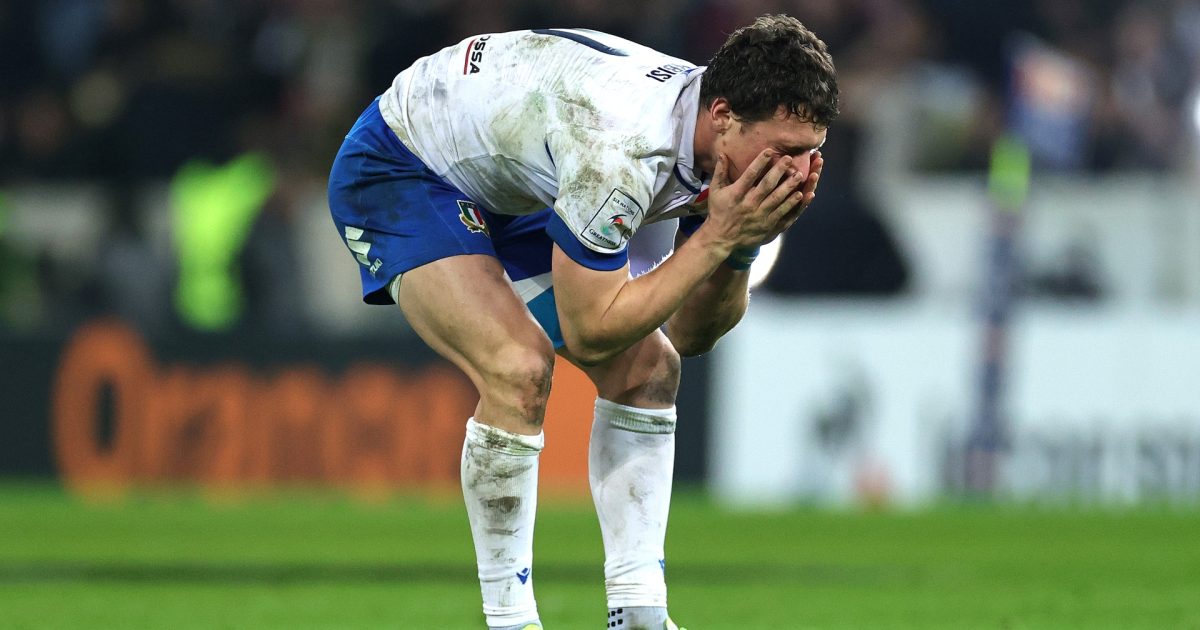Nigel Owens wades into Italy missed kick debate and Danty red card

Retired referee Nigel Owens has had his say on two of last weekend’s major Guinness Six Nations talking points – the drama of Italy’s Paolo Garbisi missing his last-gasp penalty kick to beat France and the red card that was showing earlier in that game in Lille to French midfielder Jonathan Danty.
With the contest tied at 13-all, out-half Garbisi had the chance to make history by landing his penalty kick to secure the 16-13 victory that would have been the first away win in France for Italy.
Instead, despite the stadium being protected from the elements as the roof was closed, the ball somehow fell off the tee, there was a French charge and Garbisi rushed to place the ball again on the tee for fear of getting timed out on the shot clock.
He got his kick away before the minute allotted to take the kick elapsed but his effort collided with an upright and the game’s final whistle sounded soon after to confirm a draw.
The incident ignited a lively post-game debate surrounding the French charge and whether they should have been penalised.
A dramatic finish in Lille 😱#GuinnessM6N #FRAITA pic.twitter.com/0mZzLmr1mT
— Guinness Men's Six Nations (@SixNationsRugby) February 25, 2024
Test centurion referee Owens has now waded into the conversation with the latest episode of Whistle Watch, the midweek World Rugby series that reviews refereeing incidents from the previous weekend’s games.
He said: “The big talking point of course was the end of the game, 13-all, history in the making, ball comes off the post.
“But what happens around that? Okay, we have the ball falling off the tee. That is pretty much irrelevant in a penalty what the opposition can do.
“Now the opposition can charge a conversion once a player indicates that he is going to start his run-up. A penalty you can’t. You cannot charge a penalty until the player has made contact with the ball.
“So we have a French player coming up because the ball has fallen off the tee. The French player comes up probably not to charge it, he comes up because he can see the ball falling off the tee and now thinks he can charge. He can’t.
“What should have happened here, what the game management and sensible decision should have been here was to say, ‘Look, the ball had fallen off the tee, stop the clock, replace the ball, send the French player back and let the player reset to take his kick again rather than him think he has to because the clock is running’.
“But the key thing here, as a lot of you have been discussing, is if you felt that the French players were encroaching illegally and the kicker misses the kick, then in law it’s quite clear – the kick is to be retaken, another penalty awarded 10 metres further on.”
Owens was mindful not to be critical of Christophe Ridley, adding: “Remember here we have a young referee doing his first Six Nations game.
“Congratulations Christophe Ridley and Andrea Piardi (Ireland versus Wales) on doing their first Six Nations games. Italy a little bit unlucky. The French? Very lucky.”
Switching to the second major talking point from the draw in Lille, the red card that Danty has subsequently received a five-game ban for, Owens said: “We have the usual process.
“You have foul play, it reaches the yellow card threshold, it goes to the bunker and then the bunker reviews it which means the game can carry on in the meantime and they upgraded, quite rightly so, to a red card.
“So we have foul play, we have head contact, we have a high degree of danger and therefore we have a red card. It’s all about making the game as safe as we possibly can.”



























